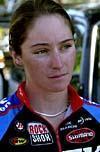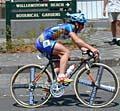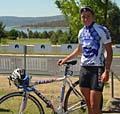
Cyclingnews talks with Rochelle Gilmore
By Jeff Jones
 |
Over the past four years, Australian cyclist Rochelle Gilmore has been one of the country's best junior track sprinters, winning ten national track and road championships. She has now moved into the senior ranks, where she has just finished the women's Tour de Snowy in 51st place, picking up second in the points classification.
This combined with a good result in the Bay Series criteriums and an Australian Institute of Sport road scholarship has made her think of a road career sooner, rather than later.
CN: You have only recently turned 19 - how old were you when you first started cycling?
RG: I was 15 years old. I gave up all of my other sports to pursue a career in cycling.
CN: What was it that attracted you to cycling?
RG: It was an Olympic sport and I could use my 10 years of BMX experience. I have always loved riding my bike and I have always dreamed of going to the Olympics, even at the age of 15 when I first started cycling, I realized that it is a very serious and competitive sport. I think that is what attracted me the most.
CN: Has it interfered with your school career much?
RG: I left school at a young age so I could train and travel more for cycling. I really enjoyed school, so after a year of full time cycling I decided to start studying again. This time a much more practical option was to do it by correspondence, it was also better because I could study more specifically what I like and enjoy. (Sports science)
I obtained a diploma in sports journalism after completing a course at the Australian College of Journalism last year.
CN: You have been quite successful on the track, especially in sprint events [she is the current Oceania champion]. What are your ambitions in this area?
RG: I don't believe that I have the correct physique to be the best sprinter in the world. I have considered the sprint as an option, but decided that the strength and power work that I would need to do may limit my options to ride on the road during the next few years. Track endurance and road racing will work hand in hand, and hopefully I can use my sprint speed to bring good results.
 |
CN: Then there is the road. During the Bay Series Criteriums, you managed to out-sprint Anna Millward on three occasions. How did you feel about that, given her status?
RG: It is a great feeling to beat the number one road sprinter in the world, but I need to consider that the Bay crit series is early season for Anna and also the fact that the races are only 45 minutes long. The Bay crit series is the only time I have had the opportunity to sprint against Anna and even though I have managed to out sprint her nearly every time, I think I need a couple of years and a lot of hard work before I will be beating her at the end of a 130 km road race in the mountains.
CN: Did this give you more food for thought about a road career?
RG: Yes, a little more I guess, I have always pictured a career on the road, I just didn't expect an AIS scholarship and the opportunity this early.
CN: What are your plans this year?
RG: My main goal is to be on the podium at the world track championships this year. I will do a fair bit of road work this year in order to increase my strength endurance, aiming, hopefully for some stage wins in the Tour De Snowy and Giro d'Italia along the way.
I am also looking to do well in the track World Cup in Malaysia and the Italian World Cup.
CN: Without giving away trade secrets, are you a big or a small gear sprinter?
RG: Coming from a BMX background I have good leg speed and tend to use a smaller gear on the track. On the road I sprint in the same gears as most of the younger girls.
CN: What is your least favorite aspect of cycling?
RG: The women in the sport that hold a grudge after a race. It builds a lot of tension between riders and it makes races really unenjoyable at times.
CN:Your favorite training ride?
RG: Any flat recovery ride along the beach on a nice sunny day.
CN:And your favorite food and off the bike activity?
RG: I love good quality ice cream. I like to take my surf board and spend the day at the beach when I don't have any racing coming up. Other than that I like to sit down and study sports science when I get the time.
CN: What's your impression of Australian cycling post-Olympics, and women's cycling in particular? There has obviously been a reduction in funding. How has this affected the sport do you think?
 |
RG: There looks to be a depth problem in women's cycling. The better riders are getting old or have reached a plateau, yet the younger riders still have difficulty in competing with these older riders. The funding situation will obviously impact this negatively.
As a result, many starting positions at world level (e.g. last years track World Championships) are being left unfilled as a result of this lack of funds. This is bad enough but we also have the situation where riders with private sponsorship or support are being denied these racing opportunities, even though they are qualified and are able to represent Australia at no cost to the ACF.
This type of thinking typifies amateur sport and has no place in a sport wishing to consider itself "professional" and hoping to attract long term support.
Other Talking Cycling Interviews